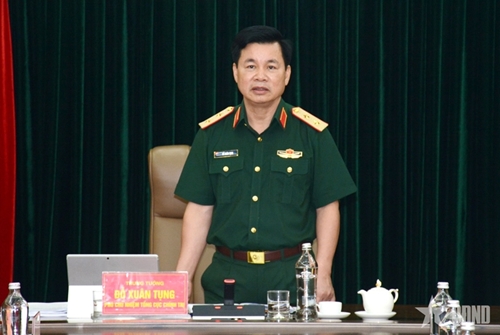At the event, participants were briefed on the decision to establish the Steering Committee of the GDP for scientific and technological development, innovation, digital transformation, implementation of Project 06, and administrative reform. The committee consists of 27 members. General Trinh Van Quyet, member of the Secretariat of the Party Central Committee, permanent member of the Central Military Commission, and Chief of the GDP, serves as Head of the Steering Committee; Lieutenant General Do Xuan Tung is the Standing Deputy Head; and the GDP Office is assigned as the Standing Body of the Steering Committee.
    |
 |
|
Lieutenant General Do Xuan Tung speaks at the conference. |
The conference also listened to a summary of the draft report proposing investment guidelines for the project “Digital ecosystem for digital transformation in the Party and political work sector for the 2026-2030 period.” Delegates actively discussed and contributed opinions to refine the content, ensuring the report meets legal requirements, is comprehensive in scope, and effective in application when deployed.
In his concluding remarks, Lieutenant General Do Xuan Tung highly praised the active and responsible participation of relevant agencies, units, and Steering Committee members. He also commended the GDP Office for promptly collaborating with involved units to develop the draft proposal, meeting progress and quality requirements. He tasked the Standing Body of the Steering Committee with fully taking in delegates’ feedback to revise the draft report.
Commanders of agencies and units were requested to continue thoroughly reviewing every aspect of the draft, especially those directly related to their areas of responsibility, and to actively contribute to the completion of the proposal for submission to competent authorities.
Lieutenant General Do Xuan Tung also urged functional agencies under the Ministry of National Defense to closely coordinate with the GDP to ensure the project’s timely and quality implementation. He stressed the need to prioritize urgent components instead of spreading resources thin. During the digitization of documents, agencies and units should proactively utilize existing technical infrastructure, equipment, and technologies already invested by the Ministry of National Defense and affiliated agencies. This approach ensures both efficiency and resource optimization.
Translated by Trung Thanh